2023届高考英二轮复习:中国传统文化二十四节气(英文版)课件(共28张PPT)
文档属性
| 名称 | 2023届高考英二轮复习:中国传统文化二十四节气(英文版)课件(共28张PPT) |  | |
| 格式 | pptx | ||
| 文件大小 | 17.2MB | ||
| 资源类型 | 教案 | ||
| 版本资源 | 通用版 | ||
| 科目 | 英语 | ||
| 更新时间 | 2023-03-23 15:43:55 | ||
图片预览


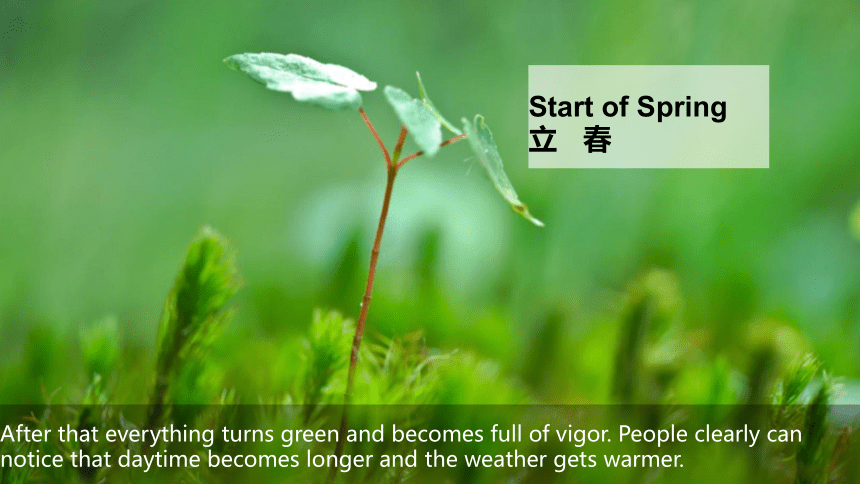
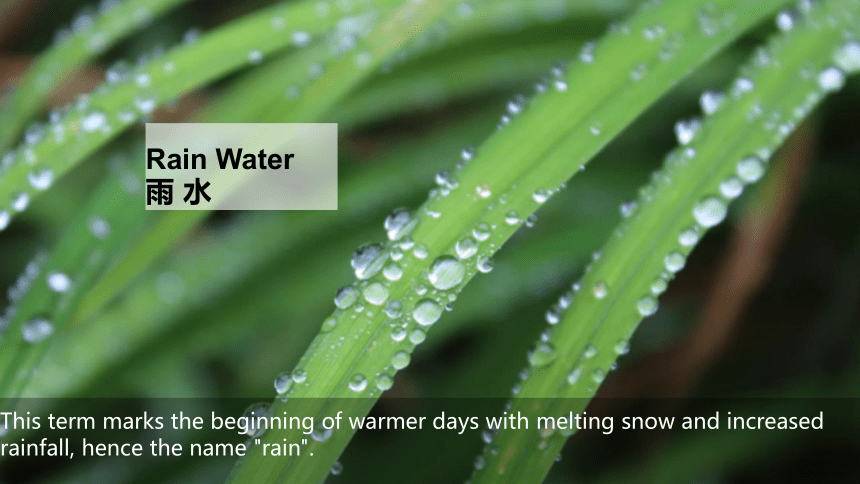
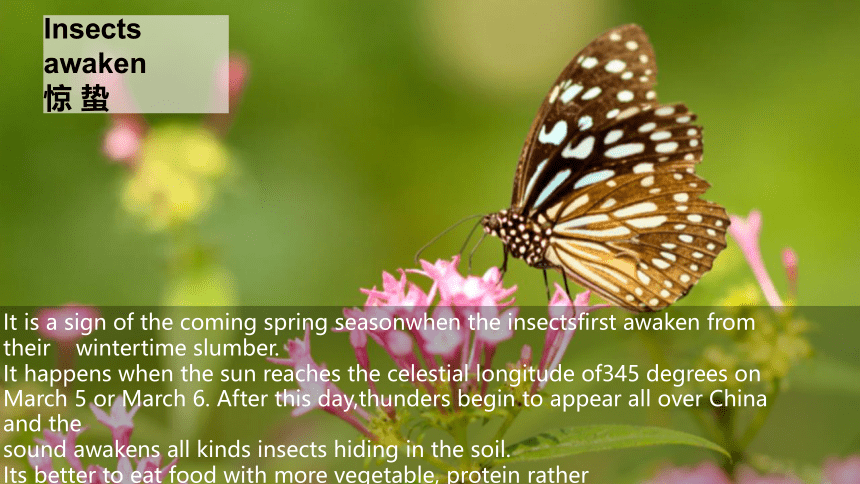
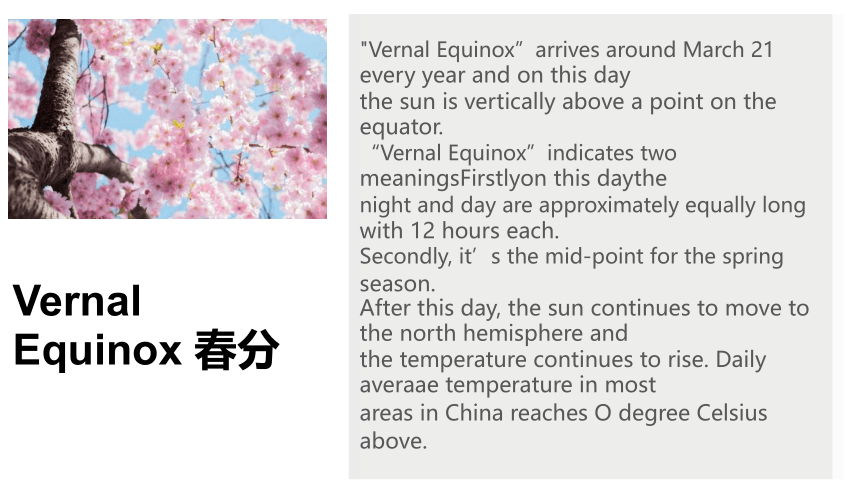
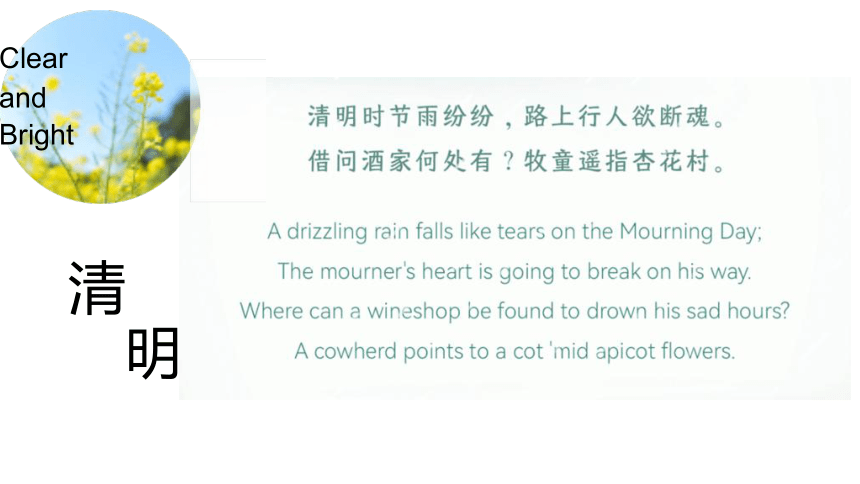
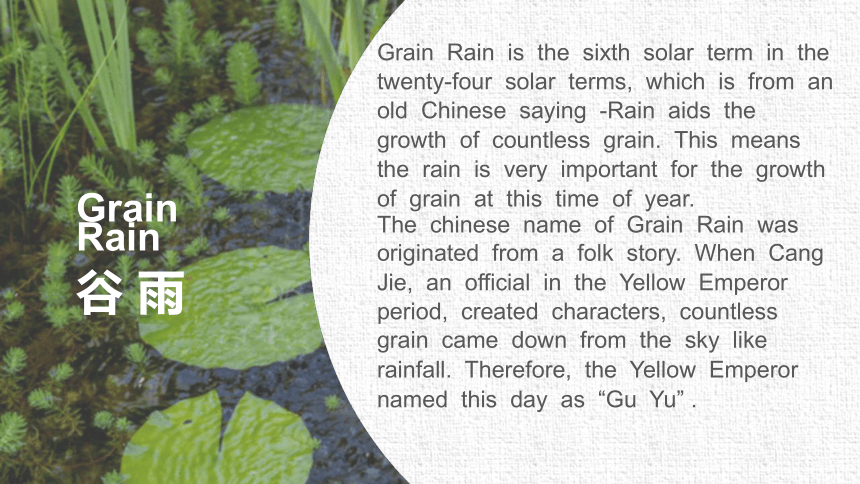

文档简介
(共28张PPT)
二十四节气
The 24 Solar Terms
节气如歌, 光阴流转
衣食农事, 依时而作
Ancient Chinese people created an overall framework to mark the annual passage of time based on observations of the sun s motion called“The 24 Solar Terms”
中国古人通过观察太阳的运动轨迹, 创立了二十四节气这个古老而科学的时间制度
passage of time 时间流逝
After that everything turns green and becomes full of vigor. People clearly can notice that daytime becomes longer and the weather gets warmer.
Start of Spring 立 春
This term marks the beginning of warmer days with melting snow and increased rainfall, hence the name "rain".
Rain Water 雨 水
It is a sign of the coming spring seasonwhen the insectsfirst awaken from their wintertime slumber.
It happens when the sun reaches the celestial longitude of345 degrees on March 5 or March 6. After this day,thunders begin to appear all over China and the
sound awakens all kinds insects hiding in the soil.
Its better to eat food with more vegetable, protein rather
than those with adipose.
Insects
awaken
惊 蛰
"Vernal Equinox”arrives around March 21 every year and on this day
the sun is vertically above a point on the equator.
“Vernal Equinox”indicates two
meaningsFirstlyon this daythe
night and day are approximately equally long with 12 hours each.
Secondly, it’s the mid-point for the spring
season.
After this day, the sun continues to move to the north hemisphere and
the temperature continues to rise. Daily averaae temperature in most
areas in China reaches O degree Celsius above.
Vernal Equinox 春分
Clear
and
Bright
清
明
Grain Rain is the sixth solar term in the twenty-four solar terms, which is from an old Chinese saying -Rain aids the
growth of countless grain. This means the rain is very important for the growth of grain at this time of year.
The chinese name of Grain Rain was
originated from a folk story. When Cang Jie, an official in the Yellow Emperor
period, created characters, countless grain came down from the sky like
rainfall. Therefore, the Yellow Emperor named this day as “Gu Yu” .
Grain Rain
谷 雨
Start of Summer
立 夏
Lixia means farewell to spring and is the beginning of summer, so it is also called “the end of spring”.
On the day of Lixia, many places have
customs such as eating“Lixia rice”, eating eggs, weighing people and tasting three
new products.
Small full of small full, rivers gradually full.
Grain Buds’s customs include grabbing water,
sacrifixing the god of the car, the birthday of the
silkworm god, eating bitter vegetables, and summer busy parties.
Grain
小
Buds
满
If you don’t plant it, it’s
useless to plant it again.
Grain in Ear is a busy solar term for farming, and the folk also call it “ busy seed” .
This is the time when rice is planted in the south and
wheat is harvested in the north.
Grain
in
Ear
芒
种
芒种芒种
The summer solstice is one of the first two solar terms established in China.
Since ancient times,people have had the custom of celebrating a good
harvest and sacrificing ancestors at this time to pray for a good year to t d t
夏
至
Summer Solstice
Minor Heat
“Small heatstrokes are not
considered hot, while large
heatstrokes occur on a hot day.”
In the past, people in southern China had the custom of “eating new” during the summer heat,
that is, tasting new rice after the
summer.
Major Heat
大暑
The big summer is hotter than the light
summer,and it is the most intense and hottest solar term of the year.
Since ancient times,the folk have had the
custom of drinking herbal tea(fucha) on three days in the summer.
Beginning of Autumn
Beginning of autumn time is between August 7th and 9th in Gregorian calendar
every year.
Beginning of autumn means that summer will cool off and autumn will begin. Beginning of autumn marks the official start of the autumn season.
立
秋
The end of head
Between August 22 and August 24 of the Gregorian calendar every year.
Being in the summer heat means "getting out of the summer heat", which means leaving in the heat.
The arrival of the summer solar term means that
the hot summer is coming to an end. The summer heat gradually subsided, and the transition from hot to cool.
Custom: On the day when the coastal area of
Zhejiang Province closed its fishing in the East China Sea, a grand fishing ceremony was held to send fishermen off to sea.
The meaning of the Millennium solar term is that the residual summer heat gradually disappears, the yin qi of heaven and earth rises and spreads, the weather turns cold gradually, and the dew in the morning
thickens day by day and condenses into a layer of white water drops on the surface of the grass, so it is called "Millennium". It means the end of Meng Qiu season and
the beginning of Mid Autumn season, which is an important festival to reflect the
temperature change in nature.
Custom:Fishermen on Taihu Lake will hold a incense ceremony to offer sacrifices to
Yu Wang in the Millennium
season.Fermented rice wine.
hit e Dew(白露)
Between September 22 and 24 of the Gregorian calendar every year.
The autumnal equinox means that day and night are equal at this time, and the days are long and the
nights are short gradually, and the autumnal equinox lives in the middle of autumn and divides the autumn equally.
Customs: Worship the moon in autumn 、Eat wild vegetables in autumn......
。
Autumnal Equinox(秋分)
Cold Dew
Between October 8 and 9 of the Gregorian calendar every year.
Due to the arrival of the cold dew, the temperature is lower than that of the
white dew, and the dew on the ground is colder, which is about to condense into frost. The climate changes from hot to cold, and everything grows with the cold, gradually falling. This is the season of alternating heat and cold.
Customs:Eat flower cakeEat sesame seeds
t b
寒
露
Frost's Descent(霜降)
Between October 23rd and 24th of the Gregorian calendar
every year.
Because "Frost" is a manifestation of cold weather and
great temperature difference between day and night, it is
named "first frost" for this solar term, which means "sudden drop in temperature and great temperature difference
between day and night". First frost doesn't mean "frost", but it means that the temperature drops suddenly and the
temperature difference between day and night is large. Custom:Appreciate the chrysanthemum and climb the mountain to overlook the reward for cultivating cattle.
Start of Winter is the first solar term of winter,
representing the beginning of winter, the beginning of March. Start of winter, Start of Spring, Start of summer and Start of autumn are called the "four Li". Spring planting, summer
cultivation, autumn harvest, winter collection, all things in
spring, grow in summer, harvest in autumn, in winter into the state of rest. Start of winter, which means that anger begins to close storage, all things into the state of recuperation,
collection, vegetation wither, insects hibernate. Such as "filial piety Jingwei" said: "bucket refers to dry, for the start of
winter, winter, the end, all things are collected."
The Start of winter is one of the "Four hours and
eight Days" in ancient society. It is a very important festival.
In some parts of China, there are customs such as ancestor
worship, feasting, and making sacrifices to the ancestors'
spirits with seasonal delicacies, so as to fulfill the obligations
and responsibilities of people's descendants and pray for a
good harvest from heaven.
In the north of China, there is a custom of eating
dumplings during the Start of Winter, to improve your life on this day. In the north, it is customary to eat dumplings at the start of winter. Because dumplings are shaped like ears,
people believe that if they eat them, their ears will not get cold in winter. In addition, dumplings homonym "Jiaozi",
meaning the start of winter is the end of autumn and winter.
Beginning
of
Winter
"Filial piety Jingwei" said: "(Start of winter) after 15 days, Dou refers to Hai, for light snow. Heaven and
earth deposit Yin, temperature is rain, cold is snow. When the words are small, the cold is not deep and the snow is not big." The Light snow solar term is a climatic concept, which represents the climatic characteristics during
the light snow solar term. Climate elements include precipitation, temperature, light and so on, among which
precipitation is an important element of climate. Light snow is a solar term reflecting the changing trend of
temperature and precipitation. Meteorological rain, snow, hail and other water vapor condensation from the sky to the ground, are called "precipitation". The name of light snow, because "snow" is the product of cold weather, the climate during this solar term is not deep and the precipitation is not heavy, so "light snow" is used to compare the climate characteristics during this solar term. The arrival of Light snow means that the weather is getting colder
and colder, and the precipitation is increasing.
As the saying goes, "Pickle vegetables in light snow, and pickle meat in heavy snow." The customs of
light snow include salted vegetables, glutinous rice cake tasting, dried fish drying, eating planing soup, brewing
light snow wine, etc. Pickled vegetable with little snow, mainly pickled vegetable in north China. In some parts of the south, there is the custom of eating ciba around light snow. It is a custom of the Tujia people to eat "gougang", a delicacy cooked with fresh pork. Light snow wine is in light snow, with new grain wine, the so-called "October
rice, for this spring wine, to the eyebrow longevity".
Minor Snow
小雪
Heavy Snow
Heavy snow is the 21st solar term in the 24 solar terms and the third solar term in winter. Douyi, the sun reaches the yellow longitude 255 degrees, intersection time for the Gregorian calendar December 6-8. Heavy Snow is the beginning of the Ganzhi lunar month,
marking the official start of midwinter. Heavy snow is a solar term that reflects the climate characteristics.
Heavy snow is characterized by a significant drop in temperature and an increase in precipitation.
Pickled meat, snowball fights, snow scenery,
nourishment are all the customs of heavy snow. There is a saying in old Nanjing that goes, "Pickle vegetables in light snow and pickle meat in heavy snow." At this
time, every door, the window sill will hang pickled meat, sausage, salted fish and other pickled products, the
formation of a beautiful scenery. If it snows heavily at this time, people will be keen to have snowball fights and enjoy the snow scenery in the ice and snow.
The Winter Solstice, with both natural and
cultural connotations, is not only an important solar term among the 24 solar terms, but also a traditional Chinese folk festival. There is a saying that "Winter Solstice is as big as a year". Since the winter solstice, the height of
the sun rises and the day increases day by day. The
winter solstice marks the rebirth of the sun and the
movement of the sun into a new cycle. Therefore, the ancient people regarded the winter solstice as the "day of good luck". In southern China, there is a custom of offering sacrifices to ancestors and feasting on Winter solstice. In northern China, there is a custom of eating dumplings on the Winter Solstice every year.
On this day, although the sun is low and the days are short, the temperature of winter solstice is not the
lowest in meteorological terms. In fact, due to
"accumulated heat" on the surface, it is usually not very cold before the winter solstice. The real cold comes after the winter solstice. Due to the wide difference in climate across China, this climatic significance of winter is
obviously late for most parts of China. The winter
solstice marks the beginning of the cold season, from which the folk began to count the cold days
冬至
Winter Solstice
小寒 Minor Cold
Minor Cold is the 23rd solar term in the 24 solar terms and the 5th solar term in winter. It is the end of the Ganzhi lunar month and the beginning of the Chou Lunar month. Bucket finger; The longitude of the sun is 285。; In the Gregorian calendar January 5-7 festival. Cold air
accumulates for a long time, and Minor cold means that the weather is cold but not to the extreme. Like Major Cold, Minor Heat, Major Heat and End of Heat, Minor Cold is a solar term indicating the change of
temperature. Minor Cold is characterized by cold, but not extreme cold.
Minor Cold marks the official beginning of winter. Cold air
accumulates for a long time. Minor cold means the weather is cold, but not to the extreme. The name of the minor cold solar term by, "the
seventy-two pentons of the month" explained: "December section, the beginning of the cold is small, so the cloud, the half of the month is big." Minor Cold refers to the accumulation of cold air and cold, which means that the weather is cold but not to the extreme. Like Major Cold, Minor Heat, Major Heat and End of Heat, Minor Cold is a solar term indicating the change of temperature. After the winter solstice, cold air frequently moves south and the temperature continues to drop. The temperature drops to the lowest point during the minor Cold and Major Cold of the
year. "Minor Cold in the second and third nine days, the cold cold to shake" enough to explain the degree of cold.
The Big Cold at the end of the year,
winter to spring, once the big cold
passed, and began a new cycle. In
some parts of China, there are many
important folk customs during the
period from Major Cold to the start of
spring, such as eliminating the old and replacing the new, making preserved
food, offering sacrifices to stoves and tail teeth. Tail tooth sacrifice, also
known as "making teeth", "making teeth sacrifice" and so on, there is a folk
custom of the whole family sitting
together after the tooth sacrifice "eating tail teeth". The popular annual meeting at the end of the New Year is a relic of the tail tooth Festival.
Major Cold is the last solar term among the 24 solar terms. Bucket refers to the ugly; The sun's longitude
reaches 300。; In the
Gregorian calendar every
year on January 20 around
the festival. Major Cold, like Minor Cold, is a solar term
that indicates how cold the
weather is. Major Cold means the weather is extremely cold. Major Cold is the coldest
period of the year during the period of March 9th and 49 th, when cold waves move
southward frequently.
大寒
Major Cold
In 2016,the 24 solar terms were included in the UNESCO’s Representative List of the Intangible Culture Heritage of Humanity.
2016年,二十四节气被正式列 入联合国教科文组织人类非 物质文化遗产代表作名录
,
In ancient times,this system not only guided agriculture production,instructing farmers to expect the changes in temperature,spring planting and autumn harvest but also directed Chinese folk customs.
This ancient time system has gained new charm and vitality in the new era.The wisdom and creativity of the Chinese,who respect and live in harmony with nature.
It has a profound impact on the way people think and their codes of conduct.
二十四节气
The 24 Solar Terms
节气如歌, 光阴流转
衣食农事, 依时而作
Ancient Chinese people created an overall framework to mark the annual passage of time based on observations of the sun s motion called“The 24 Solar Terms”
中国古人通过观察太阳的运动轨迹, 创立了二十四节气这个古老而科学的时间制度
passage of time 时间流逝
After that everything turns green and becomes full of vigor. People clearly can notice that daytime becomes longer and the weather gets warmer.
Start of Spring 立 春
This term marks the beginning of warmer days with melting snow and increased rainfall, hence the name "rain".
Rain Water 雨 水
It is a sign of the coming spring seasonwhen the insectsfirst awaken from their wintertime slumber.
It happens when the sun reaches the celestial longitude of345 degrees on March 5 or March 6. After this day,thunders begin to appear all over China and the
sound awakens all kinds insects hiding in the soil.
Its better to eat food with more vegetable, protein rather
than those with adipose.
Insects
awaken
惊 蛰
"Vernal Equinox”arrives around March 21 every year and on this day
the sun is vertically above a point on the equator.
“Vernal Equinox”indicates two
meaningsFirstlyon this daythe
night and day are approximately equally long with 12 hours each.
Secondly, it’s the mid-point for the spring
season.
After this day, the sun continues to move to the north hemisphere and
the temperature continues to rise. Daily averaae temperature in most
areas in China reaches O degree Celsius above.
Vernal Equinox 春分
Clear
and
Bright
清
明
Grain Rain is the sixth solar term in the twenty-four solar terms, which is from an old Chinese saying -Rain aids the
growth of countless grain. This means the rain is very important for the growth of grain at this time of year.
The chinese name of Grain Rain was
originated from a folk story. When Cang Jie, an official in the Yellow Emperor
period, created characters, countless grain came down from the sky like
rainfall. Therefore, the Yellow Emperor named this day as “Gu Yu” .
Grain Rain
谷 雨
Start of Summer
立 夏
Lixia means farewell to spring and is the beginning of summer, so it is also called “the end of spring”.
On the day of Lixia, many places have
customs such as eating“Lixia rice”, eating eggs, weighing people and tasting three
new products.
Small full of small full, rivers gradually full.
Grain Buds’s customs include grabbing water,
sacrifixing the god of the car, the birthday of the
silkworm god, eating bitter vegetables, and summer busy parties.
Grain
小
Buds
满
If you don’t plant it, it’s
useless to plant it again.
Grain in Ear is a busy solar term for farming, and the folk also call it “ busy seed” .
This is the time when rice is planted in the south and
wheat is harvested in the north.
Grain
in
Ear
芒
种
芒种芒种
The summer solstice is one of the first two solar terms established in China.
Since ancient times,people have had the custom of celebrating a good
harvest and sacrificing ancestors at this time to pray for a good year to t d t
夏
至
Summer Solstice
Minor Heat
“Small heatstrokes are not
considered hot, while large
heatstrokes occur on a hot day.”
In the past, people in southern China had the custom of “eating new” during the summer heat,
that is, tasting new rice after the
summer.
Major Heat
大暑
The big summer is hotter than the light
summer,and it is the most intense and hottest solar term of the year.
Since ancient times,the folk have had the
custom of drinking herbal tea(fucha) on three days in the summer.
Beginning of Autumn
Beginning of autumn time is between August 7th and 9th in Gregorian calendar
every year.
Beginning of autumn means that summer will cool off and autumn will begin. Beginning of autumn marks the official start of the autumn season.
立
秋
The end of head
Between August 22 and August 24 of the Gregorian calendar every year.
Being in the summer heat means "getting out of the summer heat", which means leaving in the heat.
The arrival of the summer solar term means that
the hot summer is coming to an end. The summer heat gradually subsided, and the transition from hot to cool.
Custom: On the day when the coastal area of
Zhejiang Province closed its fishing in the East China Sea, a grand fishing ceremony was held to send fishermen off to sea.
The meaning of the Millennium solar term is that the residual summer heat gradually disappears, the yin qi of heaven and earth rises and spreads, the weather turns cold gradually, and the dew in the morning
thickens day by day and condenses into a layer of white water drops on the surface of the grass, so it is called "Millennium". It means the end of Meng Qiu season and
the beginning of Mid Autumn season, which is an important festival to reflect the
temperature change in nature.
Custom:Fishermen on Taihu Lake will hold a incense ceremony to offer sacrifices to
Yu Wang in the Millennium
season.Fermented rice wine.
hit e Dew(白露)
Between September 22 and 24 of the Gregorian calendar every year.
The autumnal equinox means that day and night are equal at this time, and the days are long and the
nights are short gradually, and the autumnal equinox lives in the middle of autumn and divides the autumn equally.
Customs: Worship the moon in autumn 、Eat wild vegetables in autumn......
。
Autumnal Equinox(秋分)
Cold Dew
Between October 8 and 9 of the Gregorian calendar every year.
Due to the arrival of the cold dew, the temperature is lower than that of the
white dew, and the dew on the ground is colder, which is about to condense into frost. The climate changes from hot to cold, and everything grows with the cold, gradually falling. This is the season of alternating heat and cold.
Customs:Eat flower cakeEat sesame seeds
t b
寒
露
Frost's Descent(霜降)
Between October 23rd and 24th of the Gregorian calendar
every year.
Because "Frost" is a manifestation of cold weather and
great temperature difference between day and night, it is
named "first frost" for this solar term, which means "sudden drop in temperature and great temperature difference
between day and night". First frost doesn't mean "frost", but it means that the temperature drops suddenly and the
temperature difference between day and night is large. Custom:Appreciate the chrysanthemum and climb the mountain to overlook the reward for cultivating cattle.
Start of Winter is the first solar term of winter,
representing the beginning of winter, the beginning of March. Start of winter, Start of Spring, Start of summer and Start of autumn are called the "four Li". Spring planting, summer
cultivation, autumn harvest, winter collection, all things in
spring, grow in summer, harvest in autumn, in winter into the state of rest. Start of winter, which means that anger begins to close storage, all things into the state of recuperation,
collection, vegetation wither, insects hibernate. Such as "filial piety Jingwei" said: "bucket refers to dry, for the start of
winter, winter, the end, all things are collected."
The Start of winter is one of the "Four hours and
eight Days" in ancient society. It is a very important festival.
In some parts of China, there are customs such as ancestor
worship, feasting, and making sacrifices to the ancestors'
spirits with seasonal delicacies, so as to fulfill the obligations
and responsibilities of people's descendants and pray for a
good harvest from heaven.
In the north of China, there is a custom of eating
dumplings during the Start of Winter, to improve your life on this day. In the north, it is customary to eat dumplings at the start of winter. Because dumplings are shaped like ears,
people believe that if they eat them, their ears will not get cold in winter. In addition, dumplings homonym "Jiaozi",
meaning the start of winter is the end of autumn and winter.
Beginning
of
Winter
"Filial piety Jingwei" said: "(Start of winter) after 15 days, Dou refers to Hai, for light snow. Heaven and
earth deposit Yin, temperature is rain, cold is snow. When the words are small, the cold is not deep and the snow is not big." The Light snow solar term is a climatic concept, which represents the climatic characteristics during
the light snow solar term. Climate elements include precipitation, temperature, light and so on, among which
precipitation is an important element of climate. Light snow is a solar term reflecting the changing trend of
temperature and precipitation. Meteorological rain, snow, hail and other water vapor condensation from the sky to the ground, are called "precipitation". The name of light snow, because "snow" is the product of cold weather, the climate during this solar term is not deep and the precipitation is not heavy, so "light snow" is used to compare the climate characteristics during this solar term. The arrival of Light snow means that the weather is getting colder
and colder, and the precipitation is increasing.
As the saying goes, "Pickle vegetables in light snow, and pickle meat in heavy snow." The customs of
light snow include salted vegetables, glutinous rice cake tasting, dried fish drying, eating planing soup, brewing
light snow wine, etc. Pickled vegetable with little snow, mainly pickled vegetable in north China. In some parts of the south, there is the custom of eating ciba around light snow. It is a custom of the Tujia people to eat "gougang", a delicacy cooked with fresh pork. Light snow wine is in light snow, with new grain wine, the so-called "October
rice, for this spring wine, to the eyebrow longevity".
Minor Snow
小雪
Heavy Snow
Heavy snow is the 21st solar term in the 24 solar terms and the third solar term in winter. Douyi, the sun reaches the yellow longitude 255 degrees, intersection time for the Gregorian calendar December 6-8. Heavy Snow is the beginning of the Ganzhi lunar month,
marking the official start of midwinter. Heavy snow is a solar term that reflects the climate characteristics.
Heavy snow is characterized by a significant drop in temperature and an increase in precipitation.
Pickled meat, snowball fights, snow scenery,
nourishment are all the customs of heavy snow. There is a saying in old Nanjing that goes, "Pickle vegetables in light snow and pickle meat in heavy snow." At this
time, every door, the window sill will hang pickled meat, sausage, salted fish and other pickled products, the
formation of a beautiful scenery. If it snows heavily at this time, people will be keen to have snowball fights and enjoy the snow scenery in the ice and snow.
The Winter Solstice, with both natural and
cultural connotations, is not only an important solar term among the 24 solar terms, but also a traditional Chinese folk festival. There is a saying that "Winter Solstice is as big as a year". Since the winter solstice, the height of
the sun rises and the day increases day by day. The
winter solstice marks the rebirth of the sun and the
movement of the sun into a new cycle. Therefore, the ancient people regarded the winter solstice as the "day of good luck". In southern China, there is a custom of offering sacrifices to ancestors and feasting on Winter solstice. In northern China, there is a custom of eating dumplings on the Winter Solstice every year.
On this day, although the sun is low and the days are short, the temperature of winter solstice is not the
lowest in meteorological terms. In fact, due to
"accumulated heat" on the surface, it is usually not very cold before the winter solstice. The real cold comes after the winter solstice. Due to the wide difference in climate across China, this climatic significance of winter is
obviously late for most parts of China. The winter
solstice marks the beginning of the cold season, from which the folk began to count the cold days
冬至
Winter Solstice
小寒 Minor Cold
Minor Cold is the 23rd solar term in the 24 solar terms and the 5th solar term in winter. It is the end of the Ganzhi lunar month and the beginning of the Chou Lunar month. Bucket finger; The longitude of the sun is 285。; In the Gregorian calendar January 5-7 festival. Cold air
accumulates for a long time, and Minor cold means that the weather is cold but not to the extreme. Like Major Cold, Minor Heat, Major Heat and End of Heat, Minor Cold is a solar term indicating the change of
temperature. Minor Cold is characterized by cold, but not extreme cold.
Minor Cold marks the official beginning of winter. Cold air
accumulates for a long time. Minor cold means the weather is cold, but not to the extreme. The name of the minor cold solar term by, "the
seventy-two pentons of the month" explained: "December section, the beginning of the cold is small, so the cloud, the half of the month is big." Minor Cold refers to the accumulation of cold air and cold, which means that the weather is cold but not to the extreme. Like Major Cold, Minor Heat, Major Heat and End of Heat, Minor Cold is a solar term indicating the change of temperature. After the winter solstice, cold air frequently moves south and the temperature continues to drop. The temperature drops to the lowest point during the minor Cold and Major Cold of the
year. "Minor Cold in the second and third nine days, the cold cold to shake" enough to explain the degree of cold.
The Big Cold at the end of the year,
winter to spring, once the big cold
passed, and began a new cycle. In
some parts of China, there are many
important folk customs during the
period from Major Cold to the start of
spring, such as eliminating the old and replacing the new, making preserved
food, offering sacrifices to stoves and tail teeth. Tail tooth sacrifice, also
known as "making teeth", "making teeth sacrifice" and so on, there is a folk
custom of the whole family sitting
together after the tooth sacrifice "eating tail teeth". The popular annual meeting at the end of the New Year is a relic of the tail tooth Festival.
Major Cold is the last solar term among the 24 solar terms. Bucket refers to the ugly; The sun's longitude
reaches 300。; In the
Gregorian calendar every
year on January 20 around
the festival. Major Cold, like Minor Cold, is a solar term
that indicates how cold the
weather is. Major Cold means the weather is extremely cold. Major Cold is the coldest
period of the year during the period of March 9th and 49 th, when cold waves move
southward frequently.
大寒
Major Cold
In 2016,the 24 solar terms were included in the UNESCO’s Representative List of the Intangible Culture Heritage of Humanity.
2016年,二十四节气被正式列 入联合国教科文组织人类非 物质文化遗产代表作名录
,
In ancient times,this system not only guided agriculture production,instructing farmers to expect the changes in temperature,spring planting and autumn harvest but also directed Chinese folk customs.
This ancient time system has gained new charm and vitality in the new era.The wisdom and creativity of the Chinese,who respect and live in harmony with nature.
It has a profound impact on the way people think and their codes of conduct.
